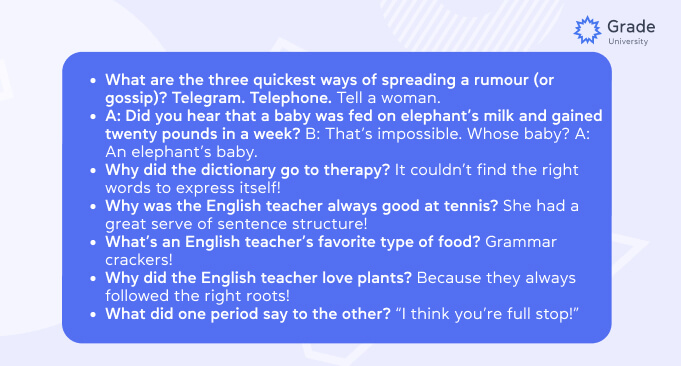
Best games for recycling vocabulary
- Vocabulary
- Teaching qualifications
- Activities
- Tips & Strategies
- Methodology

10.05.2025
One of the simplest ways to relieve tension and activate speaking is humour. Short ESL jokes in English not only help lighten the atmosphere but also naturally introduce new vocabulary, explain wordplay, and practise understanding context.
In this article, you'll find a collection of easy and fun jokes in English that can be used in an ESL classroom.
Humour can help ease the tension in the classroom, but funny jokes in English need to be used with understanding. So let's look at the main points of how to use them correctly.
English jokes work best when they naturally fit into the theme of the lesson.
For example, if you're teaching vocabulary related to food, you could use a joke like:
Why did the student eat his homework? Because the teacher said it was a piece of cake.
This not only lightens the atmosphere but also draws attention to the idiom "a piece of cake," which you can then explain and practise. When the joke is logically connected to the topic, students perceive it as part of the lesson material.
Present the joke at the right moment. For example, you can use jokes at the start of the lesson:
Teacher: "OK, before we begin… Why did the cat sit on the computer?"
Class: "Why?"
Teacher: “Because it wanted to keep an eye on the mouse!”
What’s funny to children might be boring to teenagers. And what’s funny to adults might be completely unclear to younger students. Not all jokes are equally appropriate in every class. Therefore, let's look at jokes that are suitable for different age groups.



Would you like to make your online lessons more effective and engaging? We recommend taking the free TESOL online course from Grade University. You’ll learn how to plan online lessons, keep students focused, and work with digital tools.
The course includes practical examples, tasks, and a certificate upon completion. It takes around three hours to complete and is suitable for both new and experienced teachers. It’s a great opportunity to boost your teaching skills at no cost.
There are no strict rules here. Some teachers introduce a joke of the week, while others share something funny almost every lesson. It all depends on the lesson format, topic, and the mood in the group.
Usually, one or two jokes per lesson are quite enough, especially if they are related to what you're currently studying. The main thing is that the humour is appropriate and fits naturally into the lesson.
Yes, and it’s a great idea. This task encourages creativity, provides an opportunity to practise grammar and vocabulary, and creates a relaxed atmosphere at the same time.
Quick stress-busters for busy teachers
Sometimes students might tell an unfortunate joke or say something that sounds inappropriate, especially if the humour relates to other people, nationalities, or appearance. In such cases, it's important to respond calmly, without sarcasm or judgement.
Just gently explain why such jokes are not acceptable. Make sure the class understands that there are boundaries, and you are committed to maintaining a friendly atmosphere.
This happens, and it's perfectly normal. Not all jokes evoke the same reaction — some students might not fully understand them, while others might simply not find them funny. In this situation, you can briefly explain the wordplay.
Kateryna Kuchynska
Author
Content Manager | Teacher of General English
Comments
Leave your comment